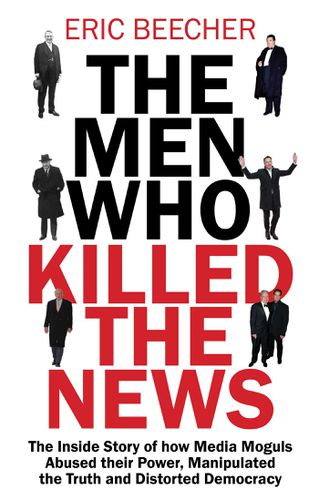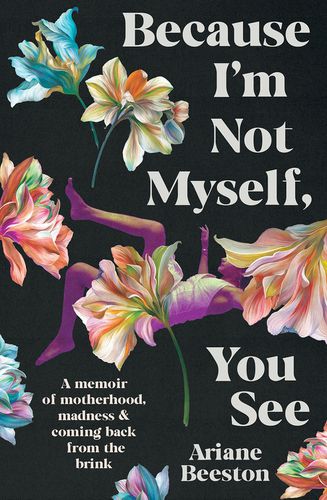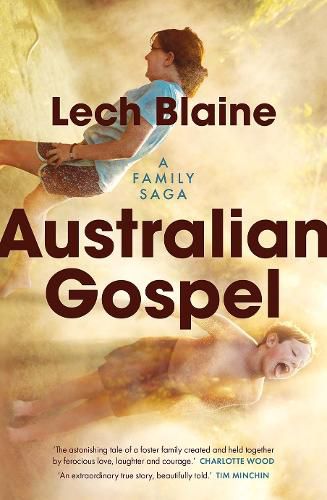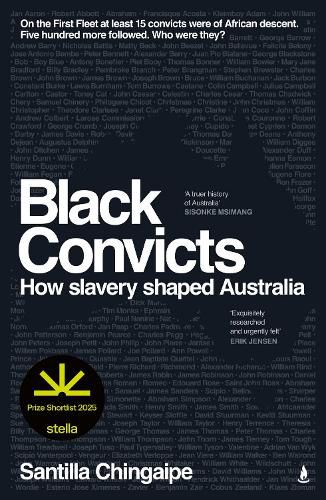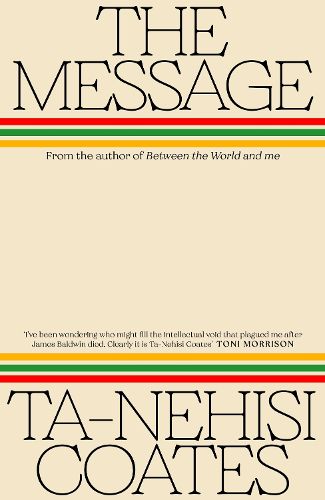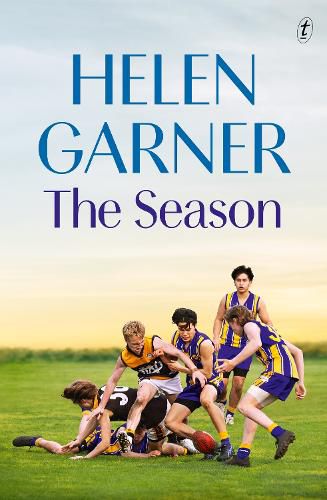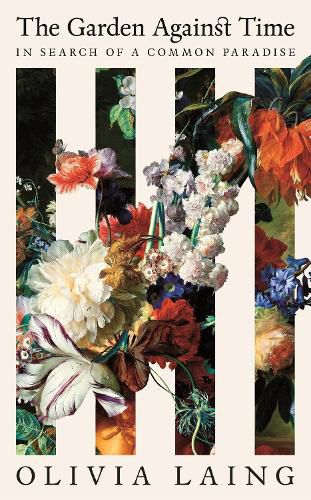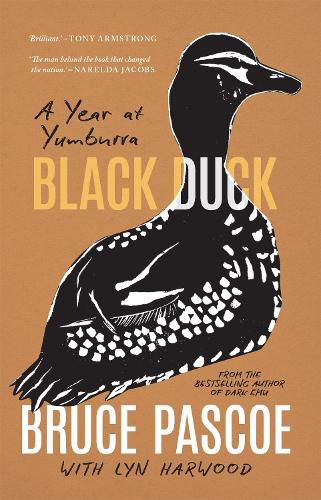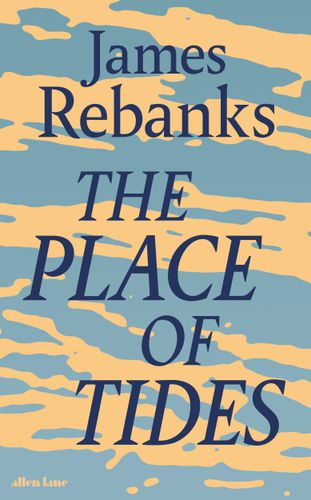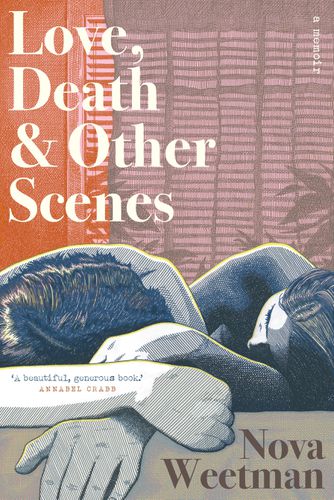Every year our staff vote for their favourite books of the past year. Here are the best nonfiction books of 2024, as voted by Readings' staff!
Titles are displayed in alphabetical order by author.
The Men Who Killed the News by Eric Beecher
‘[Eric] Beecher build[s] a compelling case that ever since the advent of the modern newspaper there have been unscrupulous media barons solely interested in power and money ... [Rupert] Murdoch had the foresight to anticipate the decline of print media and his creation of Fox News was a crucial step in securing his longevity; yet Beecher is scathing about Fox and the role it plays in shaping the world. That said, Beecher argues it is now the new media barons, such as Mark Zuckerberg, Elon Musk, Larry Page and Sergey Brin, that pose an even greater threat to public interest journalism ...
Illuminated by many stories told with an irreverent humour that will make you gasp at their malevolent audaciousness, The Men Who Killed the News is one of the most important books published here in many years. It should be read by everyone who is interested in a civil society.’
– This is an edited quote from Mark Rubbo’s review for Readings Monthly
Because I'm Not Myself, You See by Ariane Beeston
‘This [literary memoir] speaks to the experience of early motherhood in a way that will chime with readers who have found recognition or solace in books like Nicola Redhouse’s Unlike the Heart or Jessica Friedmann’s Things That Helped, as well as those who, like [Ariane] Beeston, turn to literature to help navigate whatever it is they are going through ...
Beyond the revealing account of [post-partum] psychosis itself, we also learn about Beeston’s unique life, working as a young psychologist and in a high pressure and emotionally charged job for the Department of Community Services in NSW, sometimes tasked with placing at-risk children in foster care, and then as a writer, journalist, a voice in postnatal advocacy, and a ballet teacher and dancer. Beeston broaches many topics that have, until quite recently, been glossed over in the pop-cultural representations of motherhood ... This book is necessary, and it’s wonderful.’
– This is an edited quote from Alison Huber’s review for Readings Monthly
Australian Gospel: A Family Saga by Lech Blaine
‘Buckle in, because Lech Blaine’s story about his family will blow your mind. It reminds me of Tim Winton’s Cloudstreet, but this story is true.
Michael Shelley and his wife Mary are extreme Christian fanatics who consider most of their fellow Australians to be barbarians obsessed with alcohol and sport. The Shelleys travel around Australia, believing they are disciples of God. Their children are taken from them as infants. Blaine’s parents, Lenore and Tom, are unable to have children except for Lech, so they turn to fostering. They raise their children in the pubs they run. They are loud, generous and without religious faith. They foster three of the Shelleys’ children and love them as their own. However, the Shelleys want their children back – and they are not going to give up ...
Australian Gospel is a riveting and exceptional read.’
– This is an edited quote from Chris Gordon’s review for Readings Monthly
Black Convicts: How Slavery Shaped Australia by Santilla Chingaipe
‘The history of slavery in Australia is a history that has been largely silenced. In 2020, then-Prime Minister Scott Morrison went as far as to claim that "there was no slavery in Australia". In Black Convicts, Santilla Chingaipe problematises this view ...
[B]y the time Britain reached these shores, slavery was already entrenched in the British economy and ideology. Enslaved or formerly enslaved African people sometimes came to Britain, and from there, some came to Australia on the First Fleet. Other African convicts came to Australia in the years to come. Very occasionally [during these early years of colonisation], Black people of African descent arrived in Australia as free people.
As far as the archives allow, Chingaipe considers the lives of individual Black convicts in Australia ... Black Convicts engages not just with history, but also with historiography ... [T]he history of Black convicts and slaves in Australia is finally visible, and essential reading for all.’
– This is an edited quote from Teddy Peak’s review for Readings Monthly
The Message by Ta-Nehisi Coates
‘Ta-Nehisi Coates’s Between the World and Me has long been a Readings favourite and international bestseller. His subsequent works have all flown off the shelves, including his first novel, The Water Dancer. A writer of exceptional range and virtuosity, his new work of nonfiction, The Message, is a departure from his past works in several ways, including that this book is predominantly set overseas and engages with the theoretics of journalism from a new perspective.
Coates takes his first trip to Africa, where he attempts to reconcile the difference between the Senegal of his lifetime imaginings and the modern country he encounters. Next, he returns to the US, investigating the banning of his books and the ideology behind the movement. Finally, he travels to the West Bank, where the threads of this urgent reckoning with storytelling are drawn together.’
– Elke Power, editor of Readings Monthly
The Season by Helen Garner
‘In her new book, The Season, Helen Garner reflects on how she only started to appreciate AFL in recent years, as Melbourne bounced in and out of lockdowns.
In this book, she follows her grandson, Amby, a dedicated young footballer, as he plays out a season in the under 16s. Aware of her own mortality, she wants to get to know him better, " ... to see what he’s like when he’s out in the world." Helen diligently joins Amby at his training sessions and games, riding the boundary while he jostles on the turf.
As Amby’s season progresses, Garner examines their relationship in her typical forthright manner, not afraid to dive headfirst into their family dynamics, or those within and among the teams. Time itself, and the changes it brings, is a theme Garner returns to and handles as only she can.
The Season will be appreciated by football fans, of course, but it contains multitudes.’
– This is an edited quote from Joe Rubbo’s review for Readings Monthly
The Garden Against Time: In Search of a Common Paradise by Olivia Laing
‘I have always enjoyed the way Olivia Laing writes. Just as mycelium grows from a single reference point outward in many directions, Laing creates a web of insight and interconnections that carry the reader through her curiosity and storytelling. The Garden Against Time is no exception, ranging through the lives and work of Milton, William Morris, Thomas Moore, John Clare, Derek Jarman and the aristocratic Middletons, among others, to question what a garden is; what people, ideas and costs shape these seemingly idyllic spaces, and what they mean in a broader socio-cultural and political context. Hinged particularly on Milton, and how his "Paradise Lost" is inextricable from colonial thought, this inquiry is grafted onto what is essentially a memoir.
[This] is a beautiful book best read in a well-known garden, where you can break to sit on a bench and contemplate the artful or useful beauty around you.’
– This is an edited quote from Holly Mortlock’s review for Readings Monthly
Black Duck: A Year at Yumburra by Bruce Pascoe with Lyn Harwood
‘In 2014’s Dark Emu, Bruce Pascoe shared the untold story of Indigenous agriculture ... starting a political firestorm in the process. A decade later and he is back [this time with his partner, Lyn Harwood] with Black Duck ... On one hand, it’s a deeply pragmatic book asking important questions about Indigenous disempowerment and food sovereignty. On the other it’s a beautifully meandering reflection on a year of work and living. In both cases, Country is the beating heart of Pascoe’s writing.
While on the surface the book seems to lack a driving thesis, that absence feels intentional – it is the story of a year of long days ... The meandering is the point: there should always be time in the day to watch the birds and care for the land.
It’s a refreshing approach that, coupled with the irrepressible warmth of Pascoe’s writing voice, makes Black Duck a true pleasure to read.’
– This is an edited quote from Joe Murray’s review for Readings Monthly
The Place of Tides by James Rebanks
‘Following on in his own tradition of unexpectedly revelatory and magnetic works of nonfiction, James Rebanks has in his third book, The Place of Tides, shifted focus from his accounts of life as a farmer in the Lake District (The Shepherd’s Life and English Pastoral) to the story of a single season on an isolated Norwegian island. Drawn there by a fascination with a woman he met years earlier and her unusual life on the edge of the Arctic, he writes to ask if he can visit. The woman, Anna, spends each spring caring for eider ducks while they nest and then collects the valuable down they leave behind. She accepts his request, and so it is that he shares her last season on the island, learning much about Anna herself, her ancient vocation, and himself in the process. As the reviews are unanimously declaring, this is an utterly enchanting tale of a different world and way of being.’
– Elke Power, editor of Readings Monthly
Love, Death & Other Scenes by Nova Weetman
‘Nova Weetman, an icon of Australian youth literature and [the late playwright] Aidan Fennessy’s partner of 25 years, tells her story in three acts: love, death, and other scenes. Much like grief, it isn’t linear, instead ringing with an intimacy and rawness that will floor you. There is the flush and embarrassment of young love ... the emotional and financial valleys and peaks of having a family with two creatives as parents ... Then the questions: how do you tell your young children their father will die?
Weetman’s power as a writer can put you in the room with the hardest moments of life; it will also break your heart, make you laugh and dry your tears. Like Natasha Sholl’s Found, Wanting and Leigh Sales’ Any Ordinary Day, this is an exploration of pain and love ... It’s also about how in the hardest of times ... you can still find the ropes the world throws you.’
– This is an edited quote from Fiona Hardy’s review for Readings Monthly


